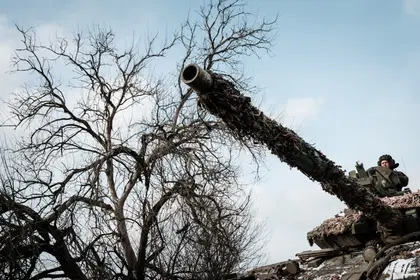In the frozen fields of the eastern Donbas region of Ukraine, a T-64 tank emerges ominously from its hiding place under camouflage netting, churning the snow into mud under its tracks.
The rusting Soviet-era hulks have led the Ukrainian fight-back against Russian forces, firing directly at enemy positions unseen a short distance away or deep behind their lines.
JOIN US ON TELEGRAM
Follow our coverage of the war on the @Kyivpost_official.
Gunner Igor Khonko, whose job it is to set the targets and fire, is in little doubt about the key role played by the 1st Tank Brigade in nearly 12 months of bitter fighting.
"For me I see this war as more of an artillery war and of heavy weapons, not infantry," he told AFP, as the thud of heavy guns close by shattered the morning air.
"Of course, there is infantry fighting but the main thing is artillery, tanks and air power," he added.
"I think that the course of the war will be changed when we receive heavy weapons: tanks, armoured personnel carriers and long-distance rockets."
After weeks of stalling, Ukraine's Western backers have finally agreed to supply it with the latest modern battle tanks, which President Volodymyr Zelensky believes could be decisive in the restive east.
For Khonko, 26, they can't come soon enough. But a more pressing need is a fresh stock of munitions.
"At the moment we're lacking shells. At some parts of the front, you use tanks more than artillery," he said.
"It can happen that you shoot 28 shells within 10 minutes... So once you're finished, you have to go back to get new ones."

‘We Need to End That Horrible, Horrible War’ – Ukraine at War Update for Dec. 23
- Repairs -
Khonko's T-64, made a full 24 years before he was born, is showing its age: shells get stuck, oil leaks and the engine can cut out, forcing emergency repairs.
The tanks are so old that his colleague Volodymyr drove one in the mid-1980s when he was conscripted in the Soviet army. Despite a few modifications, they have not changed much since, he said.
The 57-year-old carpenter, who declined to give his last name, signed up after Russia's invasion on February 24 last year and is now back in the cab.
He skillfully manoeuvres the 38-tonne machine across the countryside at speeds of up to 50 kilometres (30 miles) per hour in a deafening roar and belching fog of diesel smoke.
"We need tanks because we don't have any new ones," said Volodymyr after cutting its engine.
"One thing gets broken, then another, then another. Tanks are needed. (The new tanks) have better weapons. They don't break."
Khonko is eager to be trained to operate the new tanks, even though he has only ever seen pictures of the M1 Abrams promised by the United States on the internet.
He reels off its specifications like a car enthusiast comparing the latest high-performance models.
"The firing capacity and the damage that can be caused is much higher from a modern tank. The armour is better, so the crew is better protected," he said.
"Abrams have the best armour in the world. The Russians say that they will not be suited to this terrain but it'll be OK," he said confidently.
- Retirement -
A year ago, Khonko had not imagined that his life would be spent in the disputed Donbas, dug in against the cold, with only his comrades and an adopted pregnant cat for company.
Volodymyr hopes for an end to the war, his only son's safe return from the front, and, perhaps like the ageing T-64, retirement.
Khonko is more afraid for his parents' safety if Russia escalates its attacks in the run-up to the first anniversary on February 24.
But with fresh supplies of munitions and heavy weaponry, hopefully Ukraine will at least be able to claw back territory by the time temperatures begin to rise above freezing in the coming months, he said.
He has stayed on despite the end of his contract last September. Only when the war is won will his thoughts turn to civilian life.
"When there's a war, you cannot leave," he said. "I don't think I would be able to quit anyway because I wouldn't be able to just sit at home."
You can also highlight the text and press Ctrl + Enter






